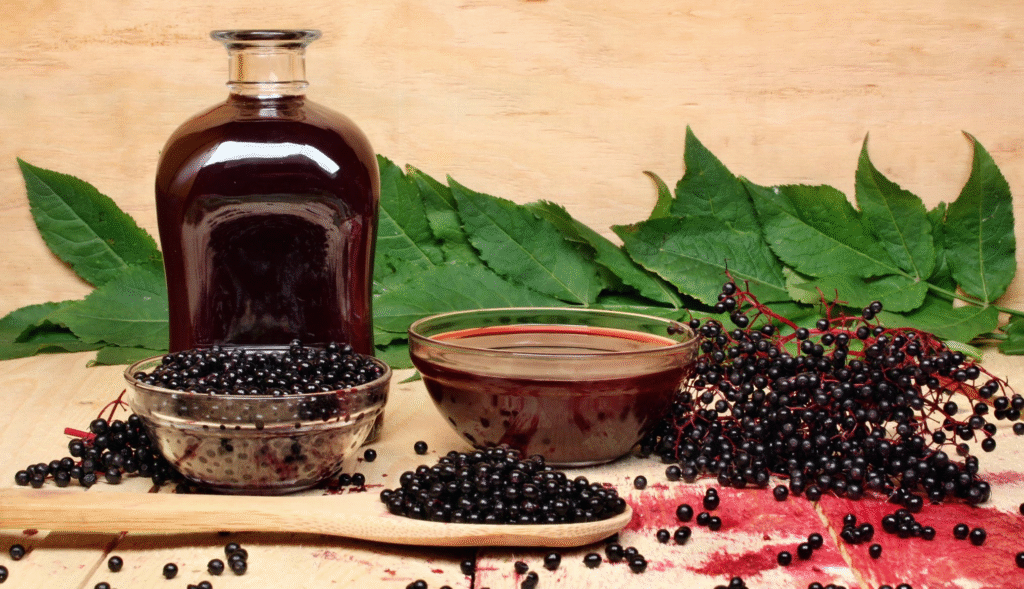Babies and toddler are remarkably efficient at picking up every bug that comes their way—especially during cold and flu season. Understandably, many parents want to do whatever they can to strengthen their child’s immune system. With that in mind, it’s easy to be intrigued when social media influencers promote elderberry as a natural immune booster. But can this popular supplement, commonly found in drugstores, actually help keep kids healthy?
According to many TikTok users, the answer is yes. Parents on the platform frequently share their experiences with elderberry syrup, claiming it reduces how often their children get sick—and shortens the length or severity of illness when they do. One user, @blessedbyelderberries, even shares that she gives her children homemade elderberry syrup daily, sometimes as often as every two hours when symptoms appear. She insists it helps minimize illness within her family.
But what do medical professionals think?
Some pediatricians have also taken to TikTok, not to endorse elderberry, but to express skepticism. For instance, Dr. Sami and Dr. Ana—known online as @ThePediPals—caution against using elderberry in children, emphasizing that it’s not medically recommended for kids.

Why Is Elderberry in So Many Kids’ Cold Products?
It’s a fair question. Elderberry has been showing up in an increasing number of children’s cold and flu products, including gummies, syrups, and immune support drops. Its use isn’t new: elderberries—specifically from the black elder tree (Sambucus nigra)—have been consumed for centuries. The berries were once a staple in ancient Greek and Roman medicine, and they were even referenced by Hippocrates, the “father of medicine,” in his work Materia Medica.
Today, elderberry is having a resurgence, with many parents claiming it helps their children stay well. It’s no surprise the demand is growing. As Dr. Heather Lehman, a pediatric allergist and immunologist in Buffalo, New York, explains, “We really don’t have effective treatments to stop viral infections, and recent research shows it isn’t safe to give young children common over-the-counter cold medications.” That leaves parents searching for safer, more natural alternatives—which is where elderberry often comes in.
Does Elderberry Actually Work?
Despite the popularity of elderberry among parents and influencers, medical evidence supporting its use in children remains limited and inconclusive.
“Elderberry supplements are not regulated by the FDA, and we have no proven evidence that they help boost the immune system or improve any health outcomes,” says Dr. Chandani DeZure, a California-based pediatrician and BabyCenter Medical Advisory Board member. She emphasizes that these supplements don’t undergo rigorous testing for safety or effectiveness.
Dr. Lehman agrees, noting that while some small studies have examined elderberry’s effects on adults and older children, the results are mixed. For example, two studies from 2004 published in the Journal of International Medical Research suggested that elderberry extract could reduce flu symptoms by up to four days in adults. However, these were small, limited studies.
More recent research has cast doubt on elderberry’s effectiveness in children. In one small study involving 87 kids aged 5 and older who had the flu, researchers found that children who took elderberry extract twice a day for five days actually took longer to recover than those who took a placebo. The conclusion? Elderberry did not improve the duration or severity of the illness.
Without larger, high-quality clinical trials, experts remain cautious. “We simply don’t know enough about elderberry’s effects—especially in younger kids,” says Dr. Lehman.
Is Elderberry Safe for Children?
Because elderberry supplements have not been thoroughly studied in children—especially those under age 5—most pediatricians do not recommend giving them to young kids. “Children are not just small adults,” says Dr. Krupa Playforth, a Virginia-based pediatrician. “Their bodies process substances differently, and some things that are safe for adults, like aspirin, are dangerous for children.”
She warns that many of the “kid-specific” elderberry products on the market provide dosing recommendations that are not based on clinical evidence. “We don’t even know what would qualify as an overdose,” she says. Most products list dosage instructions starting at ages 2 or 4, but that doesn’t mean they’re safe or effective.
Dr. Playforth, for one, does not give elderberry to her own children. “It’s simply too uncertain. There’s no clear data on safety, effectiveness, or proper dosing.”
For parents who are still interested in trying elderberry, she advises having a conversation with your child’s pediatrician first. If you do proceed, make sure the product you choose is tested by an independent third party. You can typically find this information on the label or the manufacturer’s website. Look for seals that say “third-party tested” to ensure some level of quality control.
Safer Alternatives for Treating Cold Symptoms
For babies and young children, traditional cold medications like cough suppressants, decongestants, and antihistamines are generally not recommended, especially under age 6.
Instead, Dr. Playforth recommends these safer approaches:
- Honey (for kids over age 1) can soothe a cough and may be given every few hours. Be sure to brush their teeth afterward.
- Saline nasal spray can help relieve nasal congestion and clear mucus.
- For fevers or discomfort, over-the-counter medications like Tylenol (acetaminophen) or Motrin (ibuprofen) can be used safely at the correct dosage.
Final Thoughts
Elderberry has a long history of use and a strong following online, especially among parents hoping to protect their children from frequent illnesses. However, despite its reputation as a natural remedy, there’s little scientific evidence to support its use in children—particularly those under 5.
Because elderberry supplements aren’t regulated by the FDA, and due to the lack of conclusive research on safety and effectiveness, most pediatricians urge caution. If you’re considering elderberry for your child, always consult your pediatrician first.
In the meantime, focus on proven, safe measures—like rest, hydration, honey (for toddlers), and proper fever management—when your child gets sick. As much as we all wish for a miracle remedy, good health still starts with simple, evidence-based care.